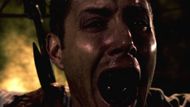Packed up fantasy, horror, and mystery, Supernatural debuted in 2005 on The WB, and then it moved over to The CW without missing a beat. It ran for fifteen seasons, with more than 300 episodes of Sam and Dean rolling around in their crusty old Impala, hunting demons, ghosts, angels, and even duking it out with God. What started as a monster-of-the-week show with X-Files vibes and a dash of American folklore ended up morphing into a self-aware, meta-laden rollercoaster that fans and critics both loved. And it proved that stories about ghosts and ghouls can hit you right in the feels because, at the core, it’s all about family and belief.
But you can’t talk about Supernatural without mentioning the SPNFamily. These fans are next level, who invented modern TV fandom on the internet. They were there, meme-ing, debating, writing fanfic, making memes before memes were even a thing. The writers saw this, too, and leaned into it hard. You get these episodes that are so meta, they practically break the fourth wall. Supernatural didn’t just acknowledge its fans; it let them rewrite the rules.
If you dig a little deeper, you’ll see it’s not just about jump scares and snarky one-liners. Supernatural is a love letter to the stuff humans have always believed—ghosts, gods, demons, and more. Those stories helped people make sense of the world, and here come Sam and Dean, dragging all those old myths into the world of smartphones and motels. The monsters are usually stand-ins for real-life pain and trauma. The show taps into end-of-the-world plotlines, using the supernatural as a way to poke at all our shared anxieties.
Now, most shows that last this long get stuck in a rut with the same stories, just a different day. But not Supernatural. The showmakers blew up their own rulebook every other season. Big twists weren’t just for shock value; they’d flip the script, kill off main characters (sometimes more than once), or flat-out nuke reality itself. No one was ever really “safe.” Every time you thought you knew where things were going, they hit a curveball. It made you question everything: fate, free will, whether you can trust the writers not to break your heart again.
By now, Supernatural is the blueprint for how to make genre TV that’s funny, scary, and surprisingly deep all at once. Tons of shows tried to copy that mix of horror and heart, but few nailed it like this one. The stakes always felt real, and every season felt like it could be a grand slam or a train wreck, and somehow, they just kept swinging for the fences. In the end, Supernatural built a whole community, held up a mirror to our fears and hopes, and rewrote what TV could be.
Today, we are going to explore ten plot twists from Supernatural that blew people’s minds. These aren’t just your average shockers; they flipped the story and messed with what we thought we knew about the characters.
Plot twists in Supernatural that changed the entire show
Sam’s first death and resurrection

The fandom lost it when Sam died at the end of Season 2. The guy gets stabbed to death by Jake, and all bets are off. Before this, most shows would wave a magic wand and the main characters would live forever. But Supernatural killed one of the Winchesters. And then Dean makes a deal with a crossroads demon to bring Sam back. That’s when you realize death is an inconvenience around here, and nobody is safe.
This was more than just a random twist; it set up that whole “deal with the devil” thing that kept coming back to haunt them. Dean’s soul-bound bargain snowballed into even bigger messes later.
Dean goes to hell

In the Season 3 finale, Dean’s demonic contract comes due. They didn’t just kill him; hellhounds tore him to shreds and literally dragged him to Hell. On screen. And it made it crystal clear that Supernatural was willing to go places most network shows wouldn’t even glance at. Ending a season with your main guy in Hell is some bold TV.
People still talk about this one. It put the show on the map, and fans were losing it on social media and everywhere else that summer.
Ruby’s betrayal

Ruby pulled the rug out from under everyone. Two whole seasons of her worming her way into Sam’s life, earning his trust, hyping him up as the chosen one in the fight against Lilith, getting all flirty just to keep us guessing. And then she flips the script and manipulates Sam into breaking the final seal to free Lucifer.
Sam was wrecked, Dean was pissed, and the fandom exploded. And sure, critics called it “an effective strategy”, but it changed the whole theme of demon lore in the show. After Ruby, nobody was safe, and you just knew the writers were out to mess with us.
Jess’s death mirrors Mary’s, launching the Winchester journey

The first episode, and they already ripped our hearts out. Jess’s death—burned on the ceiling just like Sam’s mom—was brutal. It gave Sam a reason to dive into the Winchester life. Suddenly, this wasn’t just a monster-of-the-week show; it was personal. It set the tone for all the generational trauma and revenge that would keep the Winchesters running for fifteen years.
Critics loved this bit, too. Said it gave the show way more depth than an average pilot.
The apocalypse, Lucifer, and Michael's vessels

By the time Season 4 wrapped up, and then Season 5 just flipped the script. The Winchesters went from chasing down random monsters to realizing that they were the chosen puppets for Lucifer and Michael. All those demon-hunting shenanigans felt tiny compared to these two men possibly kicking off the actual apocalypse.
Turns out, characters everyone loved were just chess pawns in this game between heaven and hell. This whole mythology made you rethink everything from earlier seasons— were Sam and Dean ever really in control, or were they just dancing to someone else’s tune the whole time? The show started hammering on those big questions: fate, free will, and family ties. Even if the world’s supposedly scripted to end, can your choices change anything? That debate still rages.
Soulless Sam

Supernatural Season 6 went full bananas with Sam coming back from Hell, but without the soul. Soulless Sam was magnetic, he still looked like Sam, sounded like Sam, but something was just off. He had no empathy, no guilt, and became a danger to everyone, including Dean. The whole thing was creepy as hell (pun intended). Critics loved it, fans freaked, and Jared Padalecki pulled it off.
Academics started a discourse on what makes a person “good” or “evil.” If you pull out someone’s soul, are they even them anymore? Soulless Sam the creepiest twist since the early demon days.
Demon Dean

After the Mark of Cain arc, the end of Season 9 just chucks a grenade into the Winchester status quo. Dean dies and pops back up as a demon. Not just some possession, this is Dean going full dark side, and he’s the sort of nightmare he used to put down without a second thought.
Season 10 kicks off and the brotherly dynamic is completely scrambled. Everyone is walking on eggshells, and fans were losing it online—some hyped, some totally freaked out about what the writers were going to pull next. Critics weren’t wrong calling it one of the gutsiest moves the show ever pulled. For a minute there, nobody had a clue what was coming, which is exactly the kind of chaos Supernatural needed.
Chuck is God

Chuck Shurley spent years being this jittery prophet. Then Season 11 rolls around and, plot twist of the century, he’s actually God. And the main reason Sam and Dean’s lives are a mess. All those goofy meta episodes and cheeky nods to fanfiction hit way harder.
The twist totally flipped the script on the whole “show about storytelling” thing. The guy pulling the strings is the actual writer—like, literally. You don’t see that kind of meta-jump on TV all that much. Academics and diehard fans couldn’t stop arguing about fate, free will, and what it means to be a creator.
Meta episodes & smashing the fourth wall

Talk about breaking the fourth wall in episodes like The Monster at the End of This Book (season 4) and The French Mistake (season 6). In the former, Sam and Dean discover novels chronicling their lives and then in latter, they get shoved into some world where they’re just actors on a TV set.
It’s these curveballs that elevated Supernatural’s meta-game. The was the show’s way of poking fun at itself, giving a nod to its own fandom, and kind of throwing reality out the window. It’s rare for a show to get that self-aware without falling flat, but Supernatural somehow made it look easy.
Critics called these episodes ridiculously clever. The whole thing just made Supernatural feel like it was in on the joke with its viewers, not just performing for them.
Alternate universes & shattering reality

So, endgame Supernatural gets nuts with the multiverse—evil twins, worlds blowing up, Chuck just deleting entire realities. Even the new spin-off, The Winchesters, is its own alternate universe. Every twist at this point felt like the writers were just daring each other to go bigger, and it worked. The ripple effect online was massive. People are still arguing about what’s canon and what’s just Chuck’s bad fanfiction.
Supernatural never played it safe, and that’s why people can’t stop talking about it.
